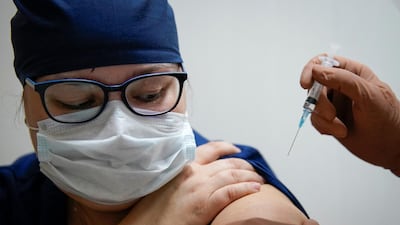The UAE will be the first country in the Middle East to hold clinical trials of Sputnik V, the Russian-developed vaccine against Covid-19, after having begun testing a joint trial with China last summer. Developing an effective vaccine or treatment for coronavirus is humanity’s best chance at beating the pandemic and securing a path to normality. It is therefore vital that countries continue to work together to find a solution.
Final-phase trials of Sputnik V are expected to begin in the Emirates by the end of November. The vaccine is currently being tested in Russia and Belarus, with a further trial planned in Venezuela. Kirill Dmitriev, the head of the Russian Direct Investment Fund, which has financed Russia's vaccine work, told CNN that his country plans to begin mass inoculation by November. There are currently more than 150 coronavirus vaccines in development worldwide, as countries compete over which nation will develop the first viable Covid-19 jab.
The Emirates has played an active part in the fight against Covid-19 by boosting international co-operation in healthcare and research. The country has sent vital medical aid to nations in need, and launched mass-testing campaigns at home. More than 11 million tests have been carried out thus far; an impressive figure in a nation of 9.6m people. The Emirates’ advanced healthcare sector and research centres have been instrumental in attracting pharmaceutical companies to roll out final phase testing for residents. Since July, more than 30,000 volunteers participated in such trials for a vaccine developed by Sinopharm, a Chinese drugmaker.
The Emirates makes for an ideal testing ground for vaccines, in large part thanks to the diversity of those living in it, which is comprised of local nationals as well as a large pool of expatriates and their families, who hail from virtually all parts of the world. The country is home to close to 200 different nationalities.
Having such variety in a pool of volunteers is crucial when testing treatments, as it reveals whether the drug works properly across race, gender and genetic factors. In the pandemic era, it is a fortunate side effect of the country’s long-term investments in the advancement of vaccine research, health care, technology and science more generally. Perhaps most of all, it is a result of long-term investment in drawing talent from around the globe, through a focus on education, promoting a welcoming environment and a culture of pluralism and tolerance.
Although vaccine development is making great strides in the UAE and elsewhere, ending the pandemic is not expected to be a straightforward process. There have been obstacles. A coronavirus vaccine study by US company Johnson & Johnson, for instance, was temporarily halted because a participant became ill.
Unfortunately, these kinds of setbacks have given fuel to concerns from anti-vaccine groups. For others, they exacerbate fears that a total cure may never be found. Severe acute respiratory syndrome, known as SARS, is a strain of coronavirus first discovered in 2003. To this day, it has no known remedy.
But our current experience with Covid-19 presents a completely different landscape – epidemiologically, scientifically, socially and politically. The efforts put into searching for a Covid-19 cure are much greater, and so are hopes for a solution. Scientific research and international co-operation, especially in the medical and pharmaceutical fields, are crucial to ending the pandemic and finding a path back to a new, safer normal. With enough resolve, we can not only find better ways to protect those most vulnerable, but to ensure that our whole society thrives.


